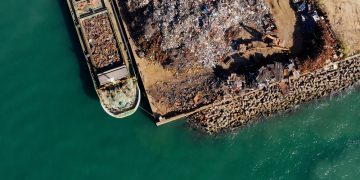During the 2025 SAFETY4SEA Manila Forum, Leo M. Bolivar, Country Manager, International Registries (Far East) Limited, emphasized that developing core soft skills is essential for competency in the evolving shipping industry.
Soft skills are a key factor in the human element on a ship and play a crucial role for competency development and emerging trends in shipping.
Soft skills are character traits and interpersonal skills that characterize relationships with other people and complement hard skills in the workplace. The human element is a complex factor that includes the actions and behaviors of people involved in shipping. The human element encompasses not only individual human factors but also the broader aspects of development, training, and continuous learning.
One major factor is fatigue—a lack of proper rest or sleep that can severely impair judgment and performance. Poor communication and misunderstandings also play a significant role, often leading to preventable mistakes. Then there’s insufficient knowledge—a failure to understand correct procedures or safety standards can result in hazardous decisions. Inadequate decision-making, especially when based on limited or inaccurate information, is another common contributor to accidents.
Moreover, dangerous working environments—such as poorly maintained or unsafe conditions—greatly increase the risk of harm. Finally, there’s the issue of local practices: informal routines or shortcuts developed over time that deviate from established protocols. These deviations may seem harmless but are often accidents waiting to happen—a ticking time bomb.
Core soft skills for maritime
Communication, problem-solving, decision-making, teamwork, and leadership are essential soft skills that must be cultivated among crew members. When we consider the relationship between these core competencies and human error, we begin to understand the deeper connection to the human element. In many cases, incidents stem not only from technical failures but from a lack of these crucial soft skills.
Take fatigue, for example. Beyond physical exhaustion, it often reflects poor time management—a skill that may not have been adequately taught or developed. Similarly, a lack of empathy can prevent crew members from understanding each other’s challenges, leading to misunderstandings and conflict. Without organizational skills, there is no clear structure, which increases stress and contributes to mental and physical fatigue.
By strengthening these soft skills, we can significantly reduce human error and create safer, more efficient maritime operations.
When there’s a lack of structure and direction, crew members may end up following different procedures, which not only create confusion but also contribute to fatigue. This is where communication skills become vital. Effective interpersonal communication—the ability to clearly convey the right message and ensure it is properly understood—is essential for coordination and safety. It’s not just about speaking, but about active listening, clarity, and mutual understanding, so that the right actions can be taken.
Similarly, a lack of knowledge often points to a gap in key soft skills such as analytical thinking, attention to detail, and problem-solving. To analyze a situation accurately, one must first have situational awareness. Without it, analysis becomes guesswork, and decision-making becomes reactive rather than strategic. Good decisions require both a clear understanding of the context and the ability to critically evaluate options—this is where critical thinking comes into play.
Ultimately, addressing human error isn’t just about correcting mistakes—it’s about building a foundation of soft skills that enable maritime professionals to anticipate, communicate, and respond effectively under pressure.
To effectively solve problems, accurate and timely information is essential. Informed decisions stem from having the right data and understanding the context. A lack of decision-making skills is a frequent source of human error. This ties directly to the need for critical thinking—the ability to assess situations logically, question assumptions, and exercise sound judgment.
Another example of human error is poor maintenance, which often reflects weak work ethic and a lack of professionalism. When individuals neglect their responsibilities, systems deteriorate, increasing the risk of failures onboard. Dependability and teamwork are crucial here—crew members must be reliable and willing to collaborate to maintain high standards.
In dangerous work environments, crew members must be adaptable, detail-oriented, and capable of applying critical thinking to assess risks and make safe decisions. Then there are local practices, often deeply ingrained habits or shortcuts taken outside standard procedures. This is where flexibility and integrity matter most—sticking to the correct standards, even when it’s inconvenient or culturally resisted, is critical to safety. Phrases like “we’ve been doing it this way for 30 years” may sound reassuring, but they often conceal risks that can accumulate over time—essentially, a ticking time bomb.
|
Human Error |
Soft Skills |
|
Fatigue |
Time management, empathy, organization |
|
Poor Communication |
Communication skills, interpersonal communication skills |
|
Lack of Knowledge |
Analysis, attention to detail, problem-solving skills |
|
Decision- making |
Decision-making skills, critical thinking |
|
Poor Maintenance |
Work ethic, dependability, teamwork |
|
Dangerous Working environment |
Adaptability, attention to detail, critical thinking |
|
Local practices |
Flexibility, integrity, leadership |
Leadership plays a pivotal role in all of this.
Without strong leadership, deviations and unsafe local practices will persist unchallenged. A good leader must be able to recognize risks, speak up, and guide the team toward safer, more effective operations.
Addressing the Human Element
One proven approach to addressing the human element is Crew Resource Management (CRM)—a system that aviation has successfully implemented for decades. While it’s often asked why we compare aviation and maritime industries, the answer is simple: both are high-risk environments. Aviation invests heavily in CRM, which focuses on non-technical skills such as communication, decision-making, teamwork, and situational awareness.
Why hasn’t the maritime industry embraced CRM to the same extent? We talk often about the need for “training, training, training,” but training alone is not enough. Without consistency, reinforcement, and a focus on soft skills, training will fall short of delivering meaningful results.
In addition to training, we also have robust management systems, clear procedures, and well-documented processes supported by modern technology—including automation and emerging AI tools—that can enhance safety and efficiency. But ultimately, none of this replaces the importance of the human factor.
The human element remains the most critical and unpredictable part of the safety equation. It’s been emphasized repeatedly in discussions, and rightly so—it deserves focused attention.
Above article has been edited from Leo Bolivar’s presentation during the 2025 SAFETY4SEA Manila Forum.
Explore more by watching his video presentation here below
The views presented are only those of the authors and do not necessarily reflect those of SAFETY4SEA and are for information sharing and discussion purposes only.
































































